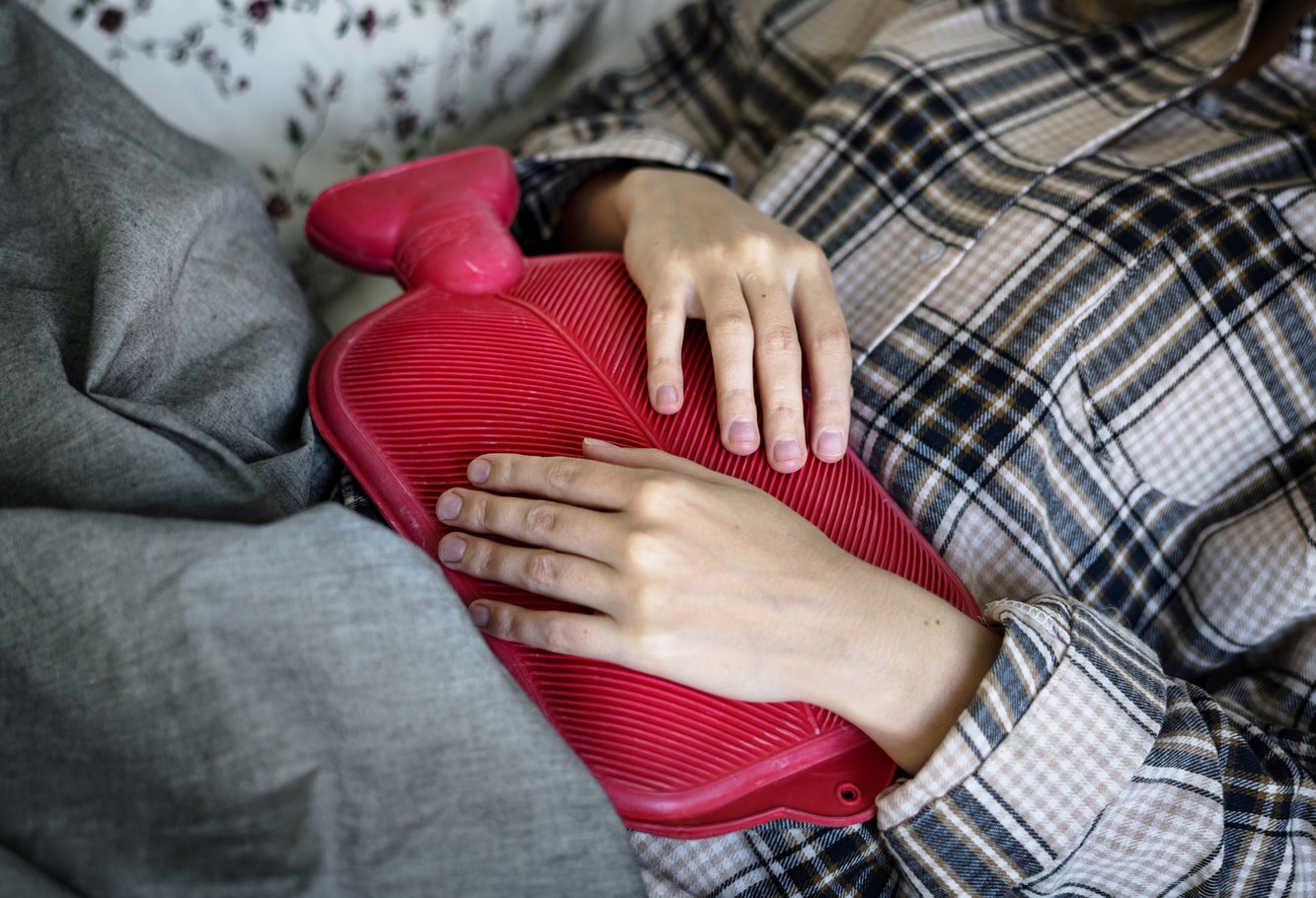
Body + Mind is reader-supported. We may earn an affiliate commission when you buy through some of the links on our site.
Few women relish the experience of changing into a paper nightgown, placing their feet in stirrups and having a stranger investigate their nether regions. Nevertheless, getting a Pap smear is an essential part of annual health screenings for women. Some women experience more severe side effects than others, such as mild to moderate bleeding. Others feel dizzy or even develop nausea after a Pap smear procedure.
Here’s how to evaluate whether your nausea after a Pap smear is typical or whether it represents a need to call your OB/GYN.
Activating your vagus nerve through cervix manipulation and stimulation can trigger nausea because your body is trying to let you know tha something abnormal is happening. You can prevent it from happening by using stress-fighting measures before your procedure and communicating your discomfort with your doctor during the Pap smear. Local anesthetics are available for pain as well.

Your cervix contains a ton of nerve endings, so some discomfort when undergoing a Pap smear is perfectly normal. And that goes beyond the unsettling feeling of exposing your most personal regions to relative strangers. Nausea after a Pap smear all comes down to your nervous system.
The vagus nerve, the longest of 12 cranial nerves, runs from the base of your skull all the way down to your pelvic area. This nerve is responsible for sending impulses to the gut. When you feel as if you’re about to pass out, the queasiness you feel is due to the action of the vagus.
Feeling sick after a Pap smear is this nerve sending the following signal to your brain: “Something is going on down here. We may need reserves, so shut down digestion and other pesky minor tasks until we figure it out.”
When you get a Pap smear, the doctor uses a speculum to open your cervix and takes a little swab of cells from the area with Q tips. The manual muscle manipulation and cotton swabbing send messages up the vagus nerve to the brain. If you’re already anxious, your body might respond by sending red flags like nausea.
Sadly, dismissing female pain is all too familiar in medicine. Most research studies only investigate men, but women’s bodily systems are significantly different — including variations in the nervous system. Simply put, it is wildly unfair for practitioners to dismiss your discomfort, but it may happen due to systemic bias.
If you experience more than mild discomfort, let your doctor know. They’ll want to know how to make the procedure less stressful for you. They might also suggest using a local anesthetic to make the experience less painful.
Your input will also contribute to your doctor’s overall view of Pap smear discomfort for other patients. For example, it was only in August of 2024 that the Centers for Disease Control and Prevention began recommending anesthesia for IUD insertion after countless women protested that the discomfort was far more than “mild.” When more people speak up about a problem, it becomes a more pressing issue to solve.

Considering the activation of the vagus nerve, feeling nauseous after Pap smear procedures is completely reasonable. It isn’t necessarily common, but it’s also not rare. If the symptom proves disconcerting, you can speak with your OB/GYN, but you shouldn’t feel overly concerned.
What symptoms warrant a phone call after your appointment? If you experience bleeding following a Pap smear, talk to your physician, especially if it continues more than a few hours after your procedure. Definitely contact your doctor if bleeding continues for more than one day unless you’re starting your normal menstrual cycle.
Women rarely experience pain following a Pap smear, but it can still happen for some people. Your uterus may contract after so much muscle manipulation. If you experience abdominal discomfort, try using an over-the-counter pain reliever or applying a heating pad to your abdomen to get relief. Some women also find relief from procedures like acupuncture as well.
If you feel anxious before your Pap smear begins, try breathing exercises to ease any tension in your body. As your mind relaxes, your muscles will follow suit. You may avoid any discomfort if your cervix is completely relaxed.
Try following a YouTube video to get into the habit of breathing exercises. The visual guide makes it easier to time your breaths.
After your procedure starts, you might feel minor discomfort. Try counting the ceiling tiles or humming a favorite tune. You could start a conversation with your doctor or squeeze a stress ball as well.
If you do experience nausea after a Pap smear, what can you do to treat it naturally? One remedy to try is homemade ginger tea. While many commercial ales contain no real ginger at all, this tasty tea helps settle upset stomachs quickly.
Eating a banana also can quiet an upset stomach rapidly. Bananas contain high levels of potassium, which helps smooth muscle tissue function. Bananas also have the extra benefit of fiber that will keep your digestive tract flowing regularly.
Finally, adding a few drops of specific essential oils to a diffuser can help alleviate nausea caused by intense triggers like chemotherapy. Try a few drops of spearmint or lavender essential oil to quiet your tumultuous tummy. You might also try suspending a few drops in a carrier oil, such as coconut oil, and dab a bit under your nose for discreet aromatherapy.
Since the issue often lies in your nervous system, tricks that calm it can often quell nausea quickly. Breathwork is a fabulous tool. Try inhaling for a count of four and exhaling for a count of five or six while lying down quietly. Deep, rhythmic breathing activates the parasympathetic side of your nervous system — the rest-and-digest portion.
Another trick is to gently massage the area around your tragus when feeling sick after a Pap smear. Your tragus is the little flap just in front of your ear, and your vagus and trigeminal nerves meet near this area. You don’t have to press hard — just enough to move the delicate skin and muscle tissue to activate the nerves.
Feeling nauseous after Pap smears results from psychological factors as much as physiological ones. Feeling nervous before a gynecologist’s appointment is typical. However, it can make any side effects from procedures seem more severe than they are.
Prior to your appointment, do some homework. Go online and research what you can expect if you’re having a pelvic exam for the first time or if several years have passed since your last visit. Set out your clothing the night before and wear your most comfortable duds.
You can also book an appointment first thing in the morning. It’s easier to keep your courage if you lack time to mull over your fears. You’ll also run less risk of ending up in the waiting room for a long time due to a backlog of other patients.
If it helps you to have support, take a friend or family member with you. You could sip some chamomile tea to calm your nerves before handing your mug to a loved one and getting in the stirrups.
Write down your concerns before your appointment so you don’t forget what you hope to discuss. If you routinely start feeling sick after Pap smears, ask your OB-GYN for recommendations. They may give you a small dose of anti-nausea medication. It should start helping immediately if it’s fast-acting. They can also provide a limited anti-anxiety prescription you can take at home.
This isn’t to say that feeling sick after a Pap smear is all in your head. It’s simply an acknowledgment that your mental state can influence your experience. For example, scientists recently discovered that your amygdala, your brain’s fear response center, directly impacts your Brunner’s glands, tiny structures in your small intestine that tell your gut how much mucus to make.
This pathway helps to explain how ongoing mental stress creates and worsens stomach disorders. Awareness of this mechanism alone may ease nausea after a Pap smear because a calm mind will make the procedure less uncomfortable.
However, an association between mental stress and feeling sick after a Pap smear doesn’t necessarily indicate causation. There is a fine line between positive thinking and self-gaslighting. If you experience more than mild discomfort, speak up. Know that your experience is valid and seek a second opinion if your gynecologist makes you feel uncomfortable or dismisses your concerns without investigating them.

Getting regular Pap smears is a critical component of female reproductive health. Pap smears protect your fertility, identify sexually transmitted diseases and detect cervical cancer early when doctors can treat the disease effectively.
Still, side effects such as nausea after Pap smears make many women hesitate to book their annual visit. Don’t allow fear to keep you from protecting your reproductive health. Your fertility and health depend on paying regular attention to matters down below.
Your stomach might feel weird after a Pap smear because the muscle manipulation activated your vagus nerve. The massive nerve directly connects to your gut. If it feels overly stimulated, it may send signals to your gut so you know something is potentially wrong.
It’s normal to feel uncomfortable after a Pap smear because you just let a relative stranger into your body, likely with another doctor or nurse in the room. If you feel intense cramping or bleeding, contact your doctor right away. Some discomfort is normal, but you shouldn’t feel intense pain or bleeding hours after your appointment.
The general side effects of a Pap smear are some minor cramping and potential discharge, which is more likely if your doctor uses lubrication to insert the speculum. Intense pain, bleeding and foul-smelling discharge are not normal and require an immediate visit with your doctor.
Original Publish Date 8/19/2019 — Updated 11/26/2024
Your email address will only be used to send you our newsletter, and at any time you may unsubscribe. For more information, see our Privacy Policy.